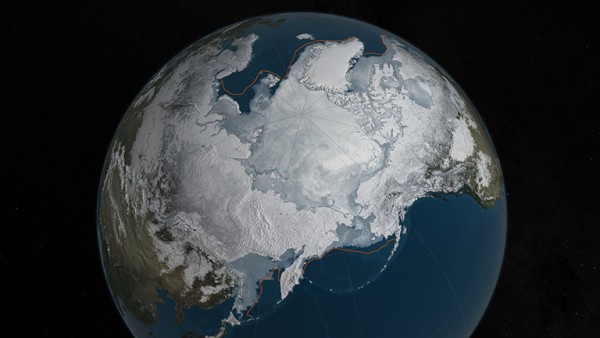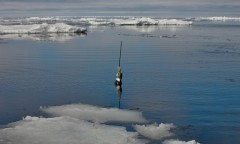By Ana Verayo, | January 24, 2017

Arctic sea ice is at a record low wintertime maximum extent for the second straight year. (NASA Goddard's Scientific Visualization Studio/C. Starr)
Scientists are seeking to stop the spread of fake news online by developing a "vaccine" to treat the public from believing in myths about climate change.
According to the lead author of the study, Sander van der Linden of the Department of Psychology at Cambridge University, the focus of this study was to provide a "cognitive repertoire" to develop a resistance to misinformation and ultimately make people less susceptible to fake or false news.
Like Us on Facebook
Linden explained that misinformation can be sticky, similar to how a virus spreads and replicates. "We wanted to see if a "vaccine" such as exposing people to small amounts of certain types of misinformation, as a warning to help preserve the facts," he said.
In this new study, researchers compared the reactions of 2,000 residents from the United States, based on two claims about global warming.
One claim involves a climate change fact recognized by experts and scientists, and the other one was obtained from a widespread misinformation campaign.
Researchers discovered that people apparently cancel out accurate or correct information when they are bombarded or repetitively shown false news or information.
However, when they are educated about distortion tactics or "inoculations," revealing how websites or media groups use this as a marketing strategy including a small dose of misinformation along with the correct facts, their opinions lean towards the correct scientific facts over false news.
By introducing this general inoculation, an average of 6.5 percent shifted to the consensus of experts on climate change, despite being exposed to fake news.
Linden noted that it is truly uncomfortable to think that this kind of misinformation is so potent in the world today. Many people are undecided about climate change even if they are aware of the debate going on. Many of them are not so sure what to believe despite hard scientific facts available to the public.
In general, if there is a conflict in opinions and messages, many will feel like they are back to square one.
This study was published in the journal Global Challenges.
-
Use of Coronavirus Pandemic Drones Raises Privacy Concerns: Drones Spread Fear, Local Officials Say

-
Coronavirus Hampers The Delivery Of Lockheed Martin F-35 Stealth Fighters For 2020

-
Instagram Speeds Up Plans to Add Account Memorialization Feature Due to COVID-19 Deaths

-
NASA: Perseverance Plans to Bring 'Mars Rock' to Earth in 2031

-
600 Dead And 3,000 In The Hospital as Iranians Believed Drinking High-Concentrations of Alcohol Can Cure The Coronavirus

-
600 Dead And 3,000 In The Hospital as Iranians Believed Drinking High-Concentrations of Alcohol Can Cure The Coronavirus

-
COVID-19: Doctors, Nurses Use Virtual Reality to Learn New Skills in Treating Coronavirus Patients










